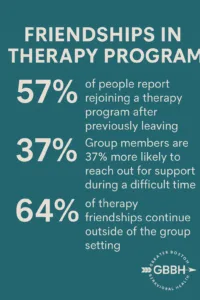Even if no one said it out loud, you might be carrying shame.
Not just for stepping back from therapy, but for the silence that followed. The unread messages. The sessions you meant to reschedule but didn’t. The group you ghosted because it felt easier than saying “I’m struggling.”
Here’s something that might surprise you: you’re not the only one who’s done that. And it doesn’t mean your shot at healing is over.
Explore therapy programs at Greater Boston Behavioral Health and what coming back could look like. You don’t have to explain everything. You just have to show up.
You Don’t Have to “Explain” Why You Left
When you step away from therapy—especially a structured program like IOP (intensive outpatient)—you might feel like you’ve broken some unspoken rule. Like maybe you “wasted your chance.” Like you’re going to be met with judgment, side-eyes, or policy reminders.
But here’s the truth: mental health recovery isn’t linear. And good therapists, good groups—they know that. They’re not here to grade your attendance. They’re here to welcome you back.
“I dipped out after a really rough week. Missed two sessions. I expected a guilt trip when I came back—but all my group leader said was, ‘It’s good to see you.’”
— Outpatient Client, 2023
No lectures. No shame. Just a quiet door that stayed open.
Why Group Therapy Friendships Hit Different
If you’re like I was, the idea of “making friends” in therapy might sound… forced. Maybe even cringey.
But here’s what happens when you spend hours each week with people who are honest about what’s hard: connection finds you. You sit in a circle and hear someone say out loud the exact thought you were too scared to admit. And suddenly, you’re not so alone.
These aren’t the kinds of friendships that need small talk. They’re built on real stuff—like showing up sad and being seen anyway.
That’s what therapy programs offer: not just support, but connection with people who get it.
In places like Needham or Dedham, where life might look calm on the outside, it’s these inside spaces that become lifelines.
Not Feeling Ready? You Don’t Have to Be.
Maybe you’re hovering over the “call” button. Maybe you’ve already hung up once.
You don’t have to feel 100% ready. You don’t even have to feel 50% ready. Therapy is one of the few places where you can walk in unsure, sit down guarded, and still belong.
Some people re-enter IOP. Some start smaller—maybe individual therapy once a week until they feel steadier. Either way, no one’s handing out grades. No one expects you to fix everything overnight.
“I rejoined group when I was still a mess. I told them I felt like a fraud. Someone said, ‘Same.’ And we just kept going.”
— Group Participant, Boston
The Real Progress Isn’t Always Obvious
You might think: “It didn’t work last time. Why would it be different now?”
But here’s what I’ve learned: healing isn’t about giant leaps. It’s about what you notice later. Like the way you reach out instead of isolate. Or how you pause before spiraling. Or when you say, “I need help” and actually mean it.
That’s the kind of progress therapy supports.
And when it happens inside a community—even one you stepped away from—it sticks in a different way.
You Can Come Back Without Starting Over
This part is big. If you left mid-treatment, you don’t have to start from scratch.
Maybe you were on week 5 of IOP. Maybe you were seeing a therapist regularly and missed a month. You can resume. Adjust. Pick back up. Most programs at Greater Boston Behavioral Health are built to be flexible, not punitive.
And whether you’re in Newton or across the bridge, that flexibility matters. Because life doesn’t always wait for you to be “on track.” It just asks you to keep going.
How Friendships in Therapy Changed Me
For me, the biggest shift wasn’t a technique or a worksheet—it was someone from group texting me out of the blue:
“Hey, haven’t seen you in a bit. You good?”
That text made me feel real again. Not broken. Not invisible. Just—missed.
And that’s what therapy gave me. A space where I didn’t have to perform. Where people saw through the silence and still held the door open.
If you’ve been feeling disconnected, this might be your reminder: you’re not done. You’re just in the middle.
FAQ: Coming Back After Leaving a Therapy Program
Is it normal to leave therapy and want to return later?
Yes. Many people pause treatment or ghost sessions during tough periods. It doesn’t mean you failed. It just means you hit a moment where continuing felt too hard. Returning is normal—and welcomed.
Will I have to start over in the therapy program?
Not necessarily. At Greater Boston Behavioral Health, many programs offer flexible re-entry. You might resume where you left off or join a new group that fits your current needs.
What if I feel awkward going back?
That’s valid. Most people feel some hesitation. But once you walk in—or log in—you’ll likely be met with understanding, not judgment. Staff and peers alike know what it’s like to come back after time away.
Are therapy friendships real or just situational?
Both can be true. You may not stay friends with everyone, but the emotional safety of those connections is very real—and it often changes how you relate to others outside of therapy, too.
Can I talk to someone before deciding to come back?
Absolutely. You can call the center just to ask questions, no pressure. A short conversation can help you figure out if now’s the right time to return, and what kind of support would be most helpful.
Want to Reconnect?
You don’t have to explain. You don’t need the perfect words. You’re not too late. And no matter how long it’s been, the door is still open.
Call (888) 450-3097 or visit to learn more about our Therapy Programs services in Boston, Massachusetts.


